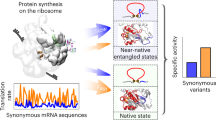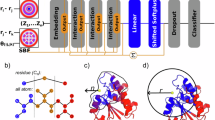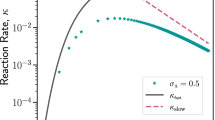Abstract
SOME time ago it was proposed that the energy produced in biological activities is partly stored in various materials through excitation of coherent electrical vibrations (polarization waves). If strong enough, such excitations can be stabilized through non-linear effects leading to various types of deformations1,2. R. Ferreira (personal communication) has suggested that such considerations might be of importance for an understanding of the action of enzymes. In fact the properties of a model which I have considered recently (unpublished) seems to support this idea.
This is a preview of subscription content, access via your institution
Access options
Subscribe to this journal
Receive 51 print issues and online access
$199.00 per year
only $3.90 per issue
Buy this article
- Purchase on SpringerLink
- Instant access to full article PDF
Prices may be subject to local taxes which are calculated during checkout
Similar content being viewed by others
References
Fröhlich, H., in Theoretical Physics and Biology (edit. by Marois, M. ) 13 (North-Holland, Amsterdam, 1969).
Fröhlich, H., Intern. J. Quantum Chem., 2, 641 (1968).
Koshland, D. E., and Neet, K. E., Ann. Rev. Biochem., 37, 359, 380 (1968).
Author information
Authors and Affiliations
Rights and permissions
About this article
Cite this article
FRÖHLICH, H. Long Range Coherence and the Action of Enzymes. Nature 228, 1093 (1970). https://doi.org/10.1038/2281093a0
Received:
Issue date:
DOI: https://doi.org/10.1038/2281093a0
This article is cited by
-
A supercharged photonic quantum heat engine
Nature Photonics (2022)
-
New Kind of Condensation of Bose Particles Through Stimulated Processes
Journal of Low Temperature Physics (2022)
-
Probing the existence of non-thermal Terahertz radiation induced changes of the protein solution structure
Scientific Reports (2021)
-
Consciousness and Quantum State Reduction—Which Comes First?
Activitas Nervosa Superior (2019)
-
Scanning Tunneling Microscopy Observation of Phonon Condensate
Scientific Reports (2017)



